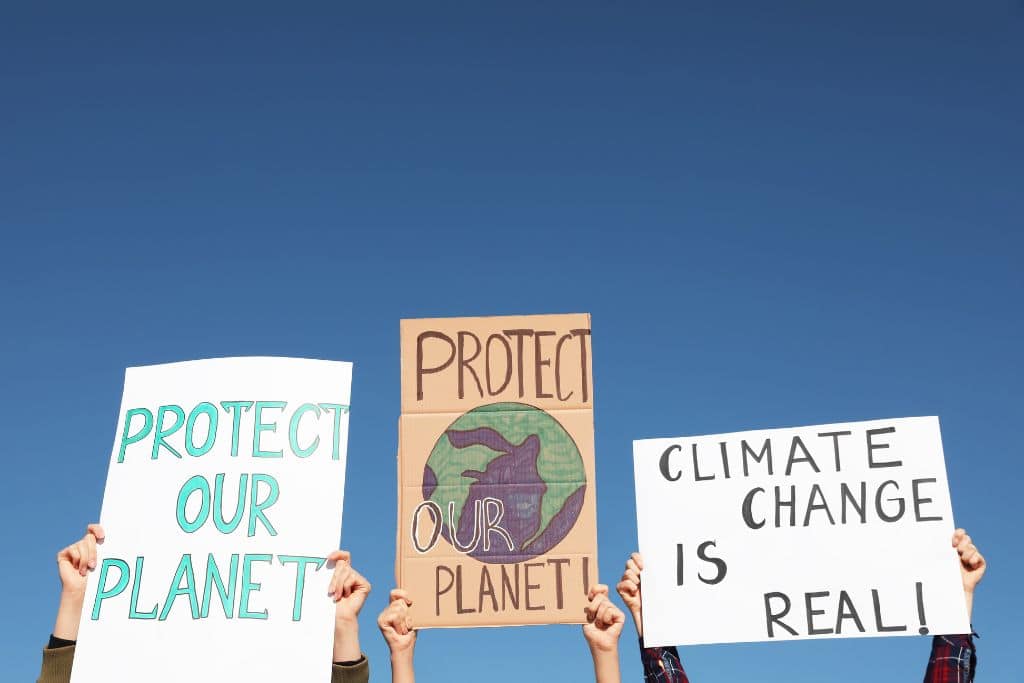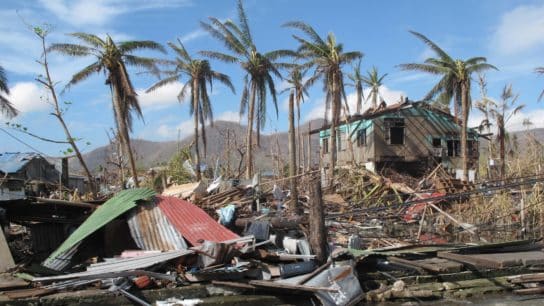As 2024 comes to an end, Earth.Org highlights the most inspiring climate stories and events that emerged throughout the year. From groundbreaking initiatives in agriculture to landmark court victories, this year showcased the resilience and creativity of communities around the globe. Join us as we celebrate the top climate headlines that not only raised awareness but also ignited hope and action in the fight against climate change.
—
1. Threatened Small Island States Hail ‘Historic’ Ocean Court Victory
In a groundbreaking court ruling, the International Tribunal for the Law of the Sea (ITLOS) in May issued an advisory opinion declaring that countries must fulfill their obligations to prevent, reduce, and control marine pollution caused by greenhouse gas emissions.
The opinion, sought by the Commission of Small Island States on Climate Change and International Law (COSIS) on behalf of nine island nations, clarifies the legal responsibilities of the 169 signatories of the 1994 UN Convention on the Law of the Sea (UNCLOS).
The ruling emphasizes that major polluters must take necessary measures to safeguard the marine environment, marking a historic precedent for future climate-related legal cases. Small island states, which contribute minimally to global emissions, face dire consequences from climate change, including coastal erosion, flooding, and saline intrusion, threatening their very existence.

COSIS representative Catherine Amirfar stressed that the decision highlights the importance of scientific evidence in shaping international law to combat climate change and the ocean’s role as a carbon sink. “The Tribunal’s decision today makes clear for the first time that it is the best available science – and not political considerations – that plays a ‘crucial role’ in determining what steps are required under international law to combat climate change,” she said.
“It is a reminder that the ocean is the biggest carbon sink, absorbing 93% of excess heat, and that ongoing inaction will result in a collapse of the global climate system with dire consequences.”
2. Historic Global Growth of Renewables Set to Outpace Countries’ 2030 Targets, IEA Says
The world is on track to add over 5,500 gigawatts of renewable energy capacity by 2030, exceeding national targets set by various governments. However, the growth is still expected to fall short of the COP28 goal to triple global renewable capacity within the same period.
China is anticipated to lead this renewable expansion, contributing about 60% of the total growth, while the European Union, the US, and India are set to more than double their renewable capacities.
Currently, renewable energy accounts for just over 30% of global electricity generation.

The increase in renewable capacity is largely driven by rising demand from the private sector and households, bolstered by supportive energy policies in nearly 140 countries.
Despite this positive trend, the International Energy Agency (IEA) cautions that fully meeting the tripling target remains achievable if governments take decisive actions, including enhancing international cooperation and implementing stronger energy policies in their Nationally Determined Contributions (NDCs).
Solar and wind energy are projected to represent approximately 95% of the expected growth, with significant contributions from both large-scale and distributed renewable energy technologies. However, the report notes that hydrogen’s contribution to this expansion remains minimal.
The IEA has urged countries to halt new gas and oil field projects, arguing that this is the only way to keep the 1.5C-compatible net-zero emissions scenario alive.
3. South Korean Youth Achieve Historic Climate Victory, Setting Important Precedent For Climate Litigation in Asia
In a groundbreaking decision, South Korea’s Constitutional Court in August ruled that the government’s climate targets are unconstitutional, marking a significant milestone in climate litigation across Asia.
The lawsuit was initiated by the youth-led group – Youth 4 Climate Action – which argued that the government’s lack of legally binding greenhouse gas reduction targets from 2031 to 2049 violates citizens’ rights.
You might also like: Meet the Young Climate Activists Spearheading Climate Action in Asia
The court determined that the current measures to combat climate change are inadequate to protect the rights of future generations, which are enshrined in the South Korean constitution. While the court upheld the government’s near-term goal of reducing emissions by 40% from 2018 levels by 2030, it highlighted the responsibility of legislators to create concrete long-term plans.
Consequently, it ordered the government to establish firm carbon-reduction targets by February 2026, emphasizing the necessity for comprehensive climate action.

This victory is particularly significant as it represents Asia’s first ruling of its kind, setting an important precedent for similar cases throughout the region. It comes amidst a growing global movement for climate justice, with young activists increasingly demanding accountability from governments.
Following the verdict, activists expressed their joy and determination, viewing the decision as a catalyst for further climate action and advocacy.
4. California Sues ExxonMobil Over ‘Decades-Long’ Deceiving Plastic Recyclability Campaign
In a landmark move against environmental deception, in September California filed a lawsuit against ExxonMobil, accusing the fossil fuel giant of misleading the public about the recyclability of its plastic products for decades.
California Attorney General Rob Bonta claims that ExxonMobil’s campaigns have significantly contributed to the ongoing plastic pollution crisis. The lawsuit highlights how the company used deceptive marketing tactics to promote the idea that plastic recycling could effectively address waste issues, despite knowing that the majority of its products are not recyclable.
Filed in the San Francisco County Superior Court, the lawsuit seeks accountability for ExxonMobil’s role as a leading producer of polymers used in single-use plastics. The state argues that ExxonMobil misled consumers with claims about recycling, using the recycling symbol to falsely suggest that nearly all its plastic products could be recycled. In reality, only about 5% of US plastic waste is recycled.
The lawsuit represents a significant step in holding corporations accountable for their environmental impact and sets a precedent for future climate litigation. As the fight against plastic pollution intensifies, Californians hope that this legal action will spur broader systemic changes and encourage more responsible practices within the plastic industry.
5. Research in Reducing Ozone-Depleting Substances Suggests Positive Trend for Climate Change Mitigation and Ozone Recovery
Research published in June highlighted significant progress in the global effort to recover the ozone layer and mitigate climate change.
The study, which appeared in Nature Climate Change, revealed that emissions of hydrochlorofluorocarbons (HCFCs), potent ozone-depleting substances, peaked in 2021, five years earlier than previously anticipated, and have started to decline, suggesting a positive trend toward ozone recovery.
The positive trend is proof of the effectiveness of the Montreal Protocol, an international treaty established in 1987 to phase out substances harmful to the ozone layer. With the protocol’s success, the ozone layer is projected to return to its 1980 levels by 2040, contributing to an estimated 0.5C reduction in global warming.
“The Montreal Protocol and its subsequent amendments have been highly effective in curbing emissions of ozone-depleting substances, but there is still some variability in this process due to the natural variation of the other atmospheric variables at play,” said Laurence Rouil, Director of the Copernicus Atmosphere Monitoring Service (CAMS).
“Hopefully, we will see the first signs of recovery of the ozone hole in the coming decades.”
Despite the progress, the research notes ongoing challenges, particularly emissions from HCFCs used in manufacturing processes that are not currently regulated under the protocol. To maintain momentum, policymakers must adapt regulations in response to new scientific findings.
6. The Hague Becomes First City in the World to Outlaw Fossil Fuel Advertising
In a historic move for climate action, the Dutch city of The Hague in September became the first in the world to outlaw fossil fuel advertising.
This groundbreaking legislation, set to take effect on January 1, 2025, bans advertisements promoting fossil fuel products and high-carbon services such as air travel and cruise ships. The initiative is part of the city’s broader commitment to achieve climate neutrality by 2030.

Supporters of the ban, including Leonie Gerritsen from the Party for the Animals, argue that allowing fossil fuel advertising is incompatible with the city’s climate goals. They believe this legislation could serve as a catalyst for similar actions worldwide, encouraging other cities and governments to take decisive steps to reduce fossil fuel consumption.
Others noted that banning fossil fuel advertising can help normalize sustainable behavior and discourage reliance on polluting products, stressing that this legal move is one of the simplest and most effective actions governments can take in response to the climate crisis.
In June, United Nations Secretary-General António Guterres urged advertising and PR agencies to stop promoting fossil fuels, linking the need for such restrictions to the successful bans on tobacco advertising. Guterres highlighted how the fossil fuel industry has engaged in greenwashing and misinformation campaigns, which have delayed meaningful climate action.
Indeed, fossil fuel giants have repeatedly used international events, social media platforms, and influencers to promote their planet-warming activities.
The annual UN climate conference itself – also known as the Conference of the Parties (COP) – is notorious for allowing fossil fuel lobbyists to join the talks. A 2023 analysis by the Climate Action Against Disinformation (CAAD) found that major fossil fuel corporations pumped millions of dollars into digital advertising in the lead-up to COP28.
7. Wind and Solar Overtake Planet-Warming Fossil Fuels in EU Electricity Generation For First Time
In a historic achievement for the European Union, wind and solar sources accounted for 30% of its electricity generation in the first half of 2024, surpassing fossil fuels, which contributed 27%. This marks the first time that renewables have overtaken fossil fuels in the bloc.
The rapid growth of wind and solar energy, alongside other low-carbon sources like hydropower and nuclear, has led to a remarkable 31% reduction in the bloc’s emissions compared to the same period in 2022.
Countries including Germany, Belgium, Hungary, and the Netherlands have successfully transitioned to renewable energy, showcasing a collective commitment to combating climate change.
In January, the Centre for Research on Energy and Clean Air’s (CREA) found that carbon dioxide (CO2) emissions in the EU fell 8% last year. This represented a 60-year low and the second-steepest year-to-year decrease after 2020, a year heavily influenced by Covid-19 lockdowns and restrictions.
Experts believe that maintaining this momentum in renewable energy deployment could lead to greater independence from fossil fuels and further reductions in greenhouse gas emissions.
8. Number of Climate Litigation Cases on the Rise as Governments and Companies Face Intensifying Scrutiny Over Inaction and Greenwashing
Climate litigation is on the rise globally, with over 2,660 cases filed since the Paris Agreement was signed in 2015. In 2023 alone, 233 new cases emerged across 55 countries, as individuals and organizations seek to hold governments and corporations accountable for climate change and greenwashing practices.
47 cases focused on “climate-washing,” where misleading claims obscure a company’s true environmental impact.
The UK and the US lead in documented climate cases, with recent rulings emphasizing the importance of considering fossil fuel emissions in project approvals.
This growing trend illustrates the role of legal action in promoting environmental justice, with more than 70% of cases initiated by NGOs and individuals. Landmark cases, such as a recent one brought by a group of elderly Swiss women to the European Court of Human Rights, have set critical precedents, reinforcing states’ obligations to mitigate climate change.
As climate litigation continues to evolve, it serves as a vital tool for accountability and policy reform in the face of the pressing climate crisis.
This story is funded by readers like you
Our non-profit newsroom provides climate coverage free of charge and advertising. Your one-off or monthly donations play a crucial role in supporting our operations, expanding our reach, and maintaining our editorial independence.
About EO | Mission Statement | Impact & Reach | Write for us














